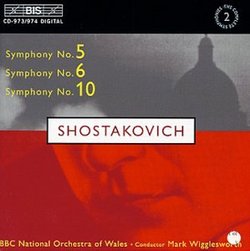| All Artists: Dmitry Shostakovich, Mark Wigglesworth, BBC National Orchestra of Wales Title: Shostakovich: Symphonies Nos. 5, 6, 10 Members Wishing: 0 Total Copies: 0 Label: Bis Release Date: 10/31/2006 Album Type: Import Genre: Classical Styles: Historical Periods, Modern, 20th, & 21st Century, Symphonies Number of Discs: 2 SwapaCD Credits: 2 UPC: 789368984220 |
Search - Dmitry Shostakovich, Mark Wigglesworth, BBC National Orchestra of Wales :: Shostakovich: Symphonies Nos. 5, 6, 10
 | Dmitry Shostakovich, Mark Wigglesworth, BBC National Orchestra of Wales Shostakovich: Symphonies Nos. 5, 6, 10 Genre: Classical
|
Larger Image |
CD Details |
CD ReviewsQuite a few ideas are at wwork, not all of them successful Santa Fe Listener | Santa Fe, NM USA | 06/15/2009 (3 out of 5 stars) "Having been bitten so many times by British critics over the years, I took the raves over Mark Wigglesworth's Shostakovich cycle with a grain of salt. But I was certainly open to be won over. Here we have three touchstone performances -- if a conductor can't carry off the Fifth and Tenth in particular, there are half a dozen notable Russians who can. I should say right off the bat that the BBC's Welsh orchestra is no great shakes, but their execution doesn't have to be sterling if Wigglesworth can captivate the listener musically.
Sym. #%: The conductor throws down a challenge to convention from the first bar with a very slow tempo, ignoring the composer's Moderato to enforce his own idea, which is almost Largo. It's a shock, and it doesn't work. Not only does the line go slack, but there's no shape to the movement as a whole, just one plodding phrase after another. The Scherzo is marked Allegro, but Wigglesworth remains determined to slow the pace, to no great effect -- was he trying to burlesque a peasant dance as Mahler does in the Ninth Sym.? When the actual slow movement arrives, it's nicely done, but we feel we've already been there. The finale is very loud and very slow, once again. In all, I lost interest long before the end. Sym. 6 -- I've always been baffled by the relative neglect of this work, which boasts one of Shostakovich's most moving, even heartbreaking slow movements. It's also the first movement, unusually. Here, wigglesworth begins to come into his own. He feels the intensity of this music and is able t communicate it, taking a true Largo while preserving the tension of the melodic line. The work concludes with two swift movements whose combination of biting wit and high jinks belies the gravity of the first movement. Wigglesworth slows them down just enough to overcome the charge of triviality. This is overall an impressive reading, with none of the perversity of the preceding fifth. Sym. 10 -- reaching this, the acknowledged masterpiece among Shostakovich's symphonies, I thought about the guts it took for a provincial UK orchestra to go up against the world's greatest orchestras. For decades the standard in the Tenth has been Karajan's two overwhelming recordings from Berlin on DG. Wigglesworth has a lot to prove, more than ever. There is no trickiness with timings; he keeps to the standard pace one hears in this work. I'd typify Wigglesworth approach as low-Key (British?) eloquence. He sin't moved by arguments that associate this music with the composer's personal struggles or subterranean defiance against Stalinism. The reading rises to moments of intensity, only to sink back down to a reflective stance that you will either appreciate for its thoughtfulness or consider a cop out, since the whole challenge in Shostakovich's major symphonies is to find a way to make them hold together against their tendency to sprawl. Wigglesworth recognizes that the Scherzo needs to be fast and furious, and he's helped by ultra-clear recording that captures every stroke of the snare drum and the excitement of skirling violins. the last two movements seem to contradict the weight and moment of what precedes them, their themes seemingly offhand, even vapid. Here I don't think it works just to play them at face value. Wigglesworth doesn't take any particular stance other than a kind of slow dignity, but he doesn't neglect to make points as the movements unfold. Without "solving" the music's mystery, he at least fives us plenty of variety in mood and color. What tis all adds up to is interesting and therefore worth hearing. You come away feeling that the conductor has something to say. Is tis great music-making or interpretation? Far form it, but as British-bred Shostakovich, it's a bit of a milestone." |

 Track Listings (5) - Disc #1
Track Listings (5) - Disc #1